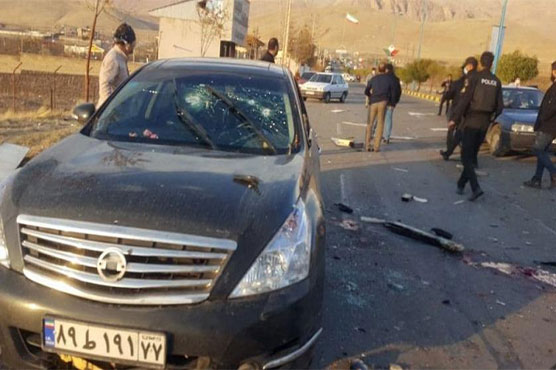Israel warns of threat to citizens abroad as Iran vows 'vengeance'

Israeli foreign ministry on Thursday said that Iran may attack Israeli targets.
JERUSALEM (AFP) - Israel warned Thursday of an increased threat against its citizens abroad following Iran s call to avenge last week s assassination of its top nuclear scientist.
The death of Mohsen Fakhrizadeh, killed in a bomb and gun attack on a major road outside Tehran on Friday, has been blamed in part on Israel s Mossad spy agency by the Islamic republic.
"In light of recent threats from Iranian elements... we fear that Iran may attack Israeli targets," the Israeli foreign ministry said.
It warned of possible attacks against its nationals in Africa and in countries geographically close to Iran, citing Georgia, Azerbaijan, Turkey, the Kurdish region of Iraq, the United Arab Emirates and Bahrain.
The National Security Council, citing attacks already carried out in France, Germany and Austria, said that global jihad organisations, especially the Islamic State group, "are demonstrating high motivation to carry out terrorist attacks."
"It is possible that part of the current wave of Islamist terrorism will reach targets identified with Israel or Jewish communities, synagogues, kosher restaurants and Jewish museums," it warned, urging travellers to check for any warnings regarding their destination.
Bahrain and the UAE normalised ties with Israel in September and commercial air links were established between Dubai and Tel Aviv late last month.
Israel s Foreign Minister Gabi Ashkenazi had been due to visit Bahrain at the weekend for a regional conference, but diplomatic sources told AFP that his trip was cancelled after Iran blamed Israel for Fakhrizadeh s assassination and threatened retaliation.
Prime Minister Benjamin Netanyahu on Thursday accused Iran of having taken advantage of its international nuclear deal -- which allowed economic sanctions to be lifted, before they were reinstated and toughened by US President Donald Trump -- in order to "extend" its influence in Iraq, Yemen and Syria.
The nuclear deal let the "tiger" out of its cage, Netanyahu said during an online discussion with Washington s Hudson Center for Analysis.
US president-elect Joe Biden has signalled his intention to resume dialogue with Iran.
Iran s Foreign Minister Mohammad Javad Zarif on Thursday called on Biden to once again lift the sanctions against his country, while excluding any renegotiation of the 2015 nuclear deal.
Iran s President Hassan Rouhani had on Saturday accused Israel of acting as Washington s mercenary, blaming the Jewish state for the killing of the nuclear scientist.
Rouhani also said, however, that his country would seek its revenge in "due time" and not be rushed into a "trap", with less than two months to go before the hawkish administration of US President Trump leaves office.
On Monday, Iran s top security official, Rear-Admiral Ali Shamkhani, alleged that "the Zionist regime and the Mossad" were involved in the scientist s killing, referring to the Israeli government and its spy agency.
Shamkhani also alleged that exiled opposition group the People s Mujahedeen of Iran was involved, in a complex operation that used electronic equipment "with no one present at the scene".
Officials in Israel have declined to comment on the attack.

